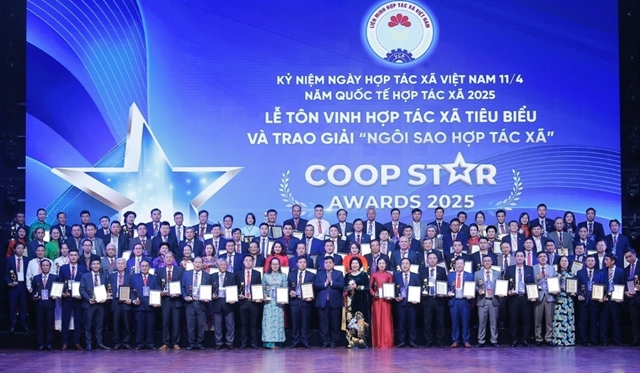The first cooperative was established in the Việt Bắc base area in 1948 following President Hồ Chí Minh's call, marking the birth of Việt Nam's collective economic sector.

HÀ NỘI — Deputy Prime Minister Nguyễn Chí Dũng on late Friday attended a ceremony in Hà Nội that celebrates and recognises outstanding cooperatives, organised by the Việt Nam Cooperative Alliance.
The Deputy PM, also head of the National Steering Committee for the Collective Economy, presented the ‘Coop Star Awards 2025’ to 100 exemplary cooperatives at the ceremony.
Speaking at the event, he recounted the history of the country’s collective economic sector.
Right after the success of the August Revolution, responding to President Hồ Chí Minh’s call in 1948, the first cooperative was established in the Việt Bắc base area, marking the birth of the sector, according to Dũng.
Over 79 years of development, policies and legal frameworks for the collective economy and cooperatives have evolved and been improved to suit each stage of national development.
By the end of 2024, the country had over 33,000 cooperatives with about six million members, and 152 cooperative unions. The collective economic sector has continued to affirm its role in supporting household economies, ensuring social welfare, political stability at the grassroots level, and directly contributing to national economic growth.
“The sector, with cooperatives at its core, has undergone positive transformations in mindset, awareness, and practical actions, and has continuously expanded in scale and number,” he said. “The cooperatives have diversified in sectors and products, better meeting domestic and export market demands.

The Deputy PM lauded the Việt Nam Cooperative Alliance, which has successfully organised a series of events during the Month of Action for Cooperatives and the second ceremony that honours outstanding cooperatives in response to the UN’s International Year of Cooperatives.
In the context of a complex and unpredictable global and regional economy, he urged ministries, sectors, local authorities, and related organisations to continue perfecting policies and mechanisms, closely following the Party's directives to further develop and improve the effectiveness of the collective economy.
Authorities at all levels should grasp real-world conditions, provide advice, allocate resources consistently, and promote the growth of the collective economic sector and cooperatives, he said.
“They should stand by and support cooperatives in overcoming difficulties in business operations, focus on training and developing human resources for the sector to meet future development needs,” he said.
Furthermore, the Việt Nam Cooperative Alliance system should focus on enhancing capacity, operational efficiency, and asserting its nationwide representative role in supporting cooperatives and cooperative unions, he added.
It must act as a bridge between the Party, the State, and the collective economy, actively promote the position and role of the collective economy and cooperatives in the country’s socio-economic development, and attract more cooperatives to become members, he said.
Dũng also called on collective economic organisations and cooperatives to be proactive, self-reliant, and resilient in business operations, as well as engaging in sustainable value chain linkages to adapt to market competition and volatility.
He urged them to embrace innovation and shift from outdated thinking to a modern economic mindset aligned with trends like the green economy, circular economy, and climate change adaptation.
The Government will continue to accompany and support collective economic organisations and cooperatives in overcoming difficulties and creating momentum to rise alongside other economic sectors, Dũng added, expressing his hope that the cooperative community will contribute even more to the nation’s development.
According to Cao Xuân Thu Vân, chair of the Việt Nam Cooperative Alliance, through the ceremony, the alliance aims to build the image and brand of cooperatives during the development and international integration process.
It also seeks to further develop the collective economy sector by linking business activities with product value chains, applying science and technology, encouraging innovation and digital transformation, and developing green, organic, and circular agriculture.
"Efforts will be made to strengthen, maintain, and improve the quality of cooperatives every year, ensuring practical and sustainable growth that brings greater benefits to the our members," she said. — BIZHUB/VNS





